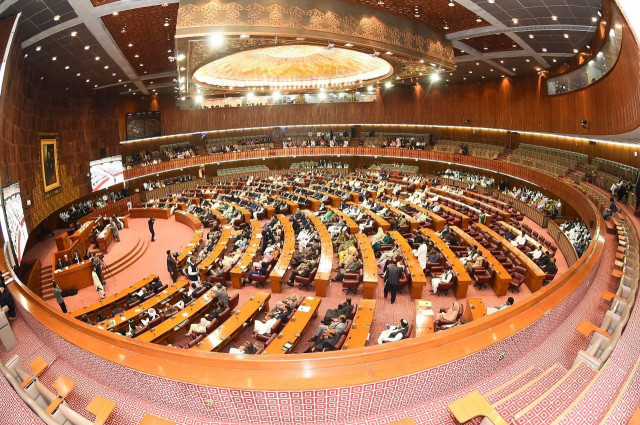Exposing sleuths’ identity now a criminal offence
NA passes six bills, including Official Secrets (Amendment) Bill, 2023

The National Assembly on Tuesday passed six bills, including the Official Secrets (Amendment) Bill, 2023, and the Toshahkhana Management and Regulation Bill, 2023, which sailed through the Senate earlier this week.
The house met here with Deputy Speaker Zahid Akram Durrani in the chair. Parliamentary Affairs Minister Murtaza Javed Abbasi tabled the bills as supplementary agenda.
A century after the enactment of the Official Secrets Act of 1923, the PML-N government amended it through a bill that wasn’t even read by a handful of lawmakers present in the National Assembly, as the lawmakers were given the copy of it just before its passage.
Maulana Abdul Akbar Chitrali expressed reservations, saying that how could a member support a bill if he hadn’t read it properly.
According to the amendments, a newly inserted Section 6-A (unauthorised disclosure of identities, etc) states that a “person shall commit an offence who intentionally acting in any manner prejudicial to public order, safety, interest or defence of Pakistan, or any part thereof, discloses in such a manner that exposes the identity of such undisclosed persons in any manner the identity of the members of the intelligence agencies, or the informants or sources thereof”.
The proposed offence carries punishment of imprisonment for a term which may extend to three years or a fine extending to Rs1 million or both.
It adds that any person, who abets, incites, conspires or attempts to commit the offence of exposing identity of a spy shall be liable to the same punishment provided for the main accused.
Separately, anyone who attempts or incites, aides, abets or attempts to commit an offence under the act shall be punishable with the same punishment as if he had committee such offence.
Among other things, the PML-N led ruling coalition has empowered the intelligence agencies to enter or search any person or place without warrants by removing the condition that search warrants be issued if a magistrate is satisfied by information on oath that there is reasonable grounds that an offence is committed or about to be committed.
The newly inserted Sub-section (2A) in Section 11 of the Secrets Act, states: “Notwithstanding anything contained in this Act or in any other law for the time being in force, the Intelligence Agencies may, at any time, enter and search any person or place, without warrant, and if necessary, by use of force, and seize any document, sketch, plan, model, article, note, weapon, ammunition, electronic or modern devices or anything of like nature, or anything which is or can be evidence of an offence committed, or suspecting of been committee, under this Act.”
Under Section 3 (offence) of the proposed act, it is stated that a person shall commit an offence if he intentionally for any purpose prejudicial to public order, defence, safety or interests of the state approaches, inspects, passes over or is in the vicinity of, or enters, attacks, destroys or otherwise undermines any prohibited place.
The section contains a long list of actions that can attract the Secrets Act, like obtaining, collecting, recording or publishing or communicating to any other person any secret official code or password, or any electronic or modern device, sketch, plan, model, article or note or other document or information, in any manner whatsoever, which is calculated to be or might be or is intended to be, directly or indirectly, useful to an enemy of the state.
Clause (8A) defines enemy. For the purpose of the Act, it says, it means “any person who is directly or indirectly, intentionally or unintentionally working for or engaged with the foreign power, foreign agent, non-state actor, organisation, entity, association or group guilty of a particular act tending to show a purpose that is prejudicial to the safety and interest of Pakistan”.
Amendment to Section 4 (communication with enemy or foreign agents to be evidence of commission of certain offence) says that a person may be presumed to have been in communication with enemy or foreign agent if he has either within or outside Pakistan visited the address of a foreign agent or consorted or associated with enemy or a foreign agent.
Amendment to Section 5 adds the words “related to the activities of Armed Forces during peace and war” after the words “prohibited place”.
Another newly inserted Section 12-A (investigation etc) states that a Grade-17 officer of the Federal Investigation Agency (FIA) shall be designated by the director general for the purpose of investigation, adding that the DG can constitute a joint investigation team as well.
Section 12-B (admissibility of material collected) says that all material collected during the course of inquiry or investigation, including electronic devices, data, information, documents, or such other related material, which facilitates the commission of any offence under the act, shall be admissible.
In view of the changing social milieu, the ‘Statement of Objects and Reasons’ states, it is quite imperative to amend the act of 1923 to ensure safety and security of the official documents to make the act more effective.
Toshakhana bill
The Toshakhana Management and Regulation Bill 2023 was approved by the National Assembly after its passage from the Senate.
According to the bill, all public office-holders, including the president, prime minister, chief ministers and cabinet members, chief justice and military officers will be obliged to submit the gifts they received in the Toshakhana (the government’s repository).
The gifts collected in the Toshakhana will be sold through public auction.
According to the bill, the recipients will not be allowed to buy antiques and vehicles at the auction.
All artefacts will be housed in museums or displayed in government-owned buildings, while vehicles received as gifts will first be deposited in the Toshakhana for transfer to the Transport/Protocol Pool of Cabinet Division.

1724319076-0/Untitled-design-(5)1724319076-0-208x130.webp)

















COMMENTS
Comments are moderated and generally will be posted if they are on-topic and not abusive.
For more information, please see our Comments FAQ